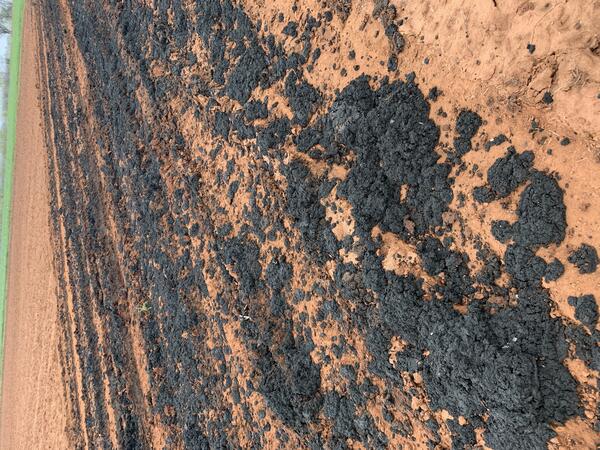Tyler Grant is a Biologist with the USGS Columbia Environmental Research Center.
Images
Columbia Environmental Research Center images.
Tyler Grant is a Biologist with the USGS Columbia Environmental Research Center.
Jenna Blanton is a biologist at the USGS Columbia Environmental Research Center.
Jenna Blanton is a biologist at the USGS Columbia Environmental Research Center.
A poster describing the habitat evaluation toolbox to support freshwater mussel restoration developed by CERC researchers.
A poster describing the habitat evaluation toolbox to support freshwater mussel restoration developed by CERC researchers.

Photo taken of a USGS scientist working on PFAS analyses in front of her mass spectrometer within a laboratory.
Photo taken of a USGS scientist working on PFAS analyses in front of her mass spectrometer within a laboratory.

A collage of "Environmental Science and Technology" publications that are related to CERC's bioinformatics PFAS research
A collage of "Environmental Science and Technology" publications that are related to CERC's bioinformatics PFAS research

Biosolids applied to soil in an agricultural setting are of interest to researchers at Columbia Environmental Research Center.
Biosolids applied to soil in an agricultural setting are of interest to researchers at Columbia Environmental Research Center.
USGS-CERC Scientists collecting aquatic insects using a suction apparatus and a lighting attraction system
USGS-CERC Scientists collecting aquatic insects using a suction apparatus and a lighting attraction system
Instrument that is part of USGS-Columbia Environmental Research Center Analytical Chemistry Capabilities
Instrument that is part of USGS-Columbia Environmental Research Center Analytical Chemistry Capabilities
Environmental fate and transport of per- and polyfluoroalkyl substances (PFAS). PFAS can be from direct and indirect releases or emissions of PFAS from producers or industrial facilities manufacturing PFAS (outlined in red). Primary sources (outlined in orange) include consumer goods, PFAS-containing firefighting foams, landfills, and wastewater treatment plants.
Environmental fate and transport of per- and polyfluoroalkyl substances (PFAS). PFAS can be from direct and indirect releases or emissions of PFAS from producers or industrial facilities manufacturing PFAS (outlined in red). Primary sources (outlined in orange) include consumer goods, PFAS-containing firefighting foams, landfills, and wastewater treatment plants.
A diagram detailing Columbia Environmental Research Center's human health risk assessment strategies as they relate to PFAS.
A diagram detailing Columbia Environmental Research Center's human health risk assessment strategies as they relate to PFAS.

Environmental and Human Health Risk Assessment Diagram related to PFAS work at USGS-CERC.
Environmental and Human Health Risk Assessment Diagram related to PFAS work at USGS-CERC.
A diagram of the food web as it relates to the microbiome of aquatic organisms. This diagram is related to PFAS research at CERC.
A diagram of the food web as it relates to the microbiome of aquatic organisms. This diagram is related to PFAS research at CERC.
An image of Columbia Environmental Research Center's wet lab after it was newly installed.
An image of Columbia Environmental Research Center's wet lab after it was newly installed.
A photo of agricultural lands with biosolids applied. Photo courtesy of Jason Masoner, USGS.
A photo of agricultural lands with biosolids applied. Photo courtesy of Jason Masoner, USGS.
A photo of a USGS scientist deploying passive sampling equipment underwater.
A photo of a USGS scientist deploying passive sampling equipment underwater.
A word cloud representing the frequency of words mentioned in the USGS PFAS Sampling Guide.
A word cloud representing the frequency of words mentioned in the USGS PFAS Sampling Guide.
Environmental fate and transport of per- and polyfluoroalkyl substances (PFAS). PFAS can be from direct and indirect releases or emissions of PFAS from producers or industrial facilities manufacturing PFAS (outlined in red). Primary sources (outlined in orange) include consumer goods, PFAS-containing firefighting foams, landfills, and wastewater treatment plants.
Environmental fate and transport of per- and polyfluoroalkyl substances (PFAS). PFAS can be from direct and indirect releases or emissions of PFAS from producers or industrial facilities manufacturing PFAS (outlined in red). Primary sources (outlined in orange) include consumer goods, PFAS-containing firefighting foams, landfills, and wastewater treatment plants.
This is a photo of two USGS scientists working in the Clinton Watershed for a Fatmucket mussel reintroduction effort.
This is a photo of two USGS scientists working in the Clinton Watershed for a Fatmucket mussel reintroduction effort.
This is an image of a mussel silo that has been deployed in the Clinton watershed.
This is an image of a mussel silo that has been deployed in the Clinton watershed.
This is an image of USGS employees working at a field site for a mussel restoration project.
This is an image of USGS employees working at a field site for a mussel restoration project.
This is an image of a mussel silo used for CERC-USGS mussel restoration efforts. The mussel silo is a bunker that houses mussels while they grow.
This is an image of a mussel silo used for CERC-USGS mussel restoration efforts. The mussel silo is a bunker that houses mussels while they grow.


















